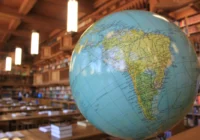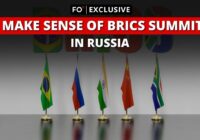Rousseff won after a bitter and acrimonious campaign, but now she faces the big challenge of reviving the Brazilian economy.
As we set out to make sense of the world for October, five key developments took place.
First, Brazilian President Dilma Rousseff won a narrow electoral victory to stay on in office. Plagued by scandals and hobbled with a faltering economy, she still rode to power on the support of the poor. Rousseff’s patrician opponent was distrusted by a large section of the population that values the bolsa familia program instituted by the president’s party under her predecessor. The initiative is widely regarded as among the best targeted programs for poverty alleviation and a quarter of Brazil’s families depend on it. Clearly, it has proven to be a great vote catcher as well.
Rousseff won after a bitter and acrimonious campaign. Now, she faces the big challenge of reviving the Brazilian economy. Inflation, rising public debt and an increasing current account deficit that has reached 3.7% of the gross domestic product (GDP) cast a dark shadow on Brazil’s future. Widespread corruption and the series of scandals buffeting Rousseff’s government do not help either. After her victory, markets have tumbled and many investors are expected to flee the country. Expect tough times ahead for the South American giant.
Second, Ebola has been raging in West Africa. With the death count reaching 5,000, there is a risk of an epidemic that might spread to other continents. While the hype is all about US intervention and what the so-called West can do to help, Cuba is providing crucial medical expertise. The World Health Organization has stated that Cuba’s decision to send a 165-member medical team to Sierra Leone is “the largest offer of a foreign medical team from a single country during this outbreak.” Perhaps US lawmakers could do well to reconsider their reactionary intransigence on Cuba and start a rapprochement with their long-sworn enemy by cooperating to contain Ebola.
Third, the world economy seems to be slowing down. Share prices, bond yields, inflation rates and oil prices are all falling. The elephant in the room is China, the factory of the world that has been growing on steroids for the last decade and more. Weighed down by debts that have increased to 250% of the GDP, fears of a Chinese slowdown have intensified. Keyu Jin of the London School of Economics questions “China’s skewed growth model,” and believes that restructuring the economy is an urgent if difficult challenge. As she points out: “Wage suppression, financial repression, and an undervalued exchange rate subsidize exports and production, at the expense of households, which are thus compelled to save, weakening domestic demand.”
The Islamic State (IS) seems to be weakening after being in the ascendant for a while. Its siege of the Syrian town of Ain al-Arab, known as Kobane in Kurdish, failed.
Fears about China are still unrealized but the nightmares about the eurozone seem to be coming true. Even the German economy, the one shining light of hope in Europe, is now stalling. Industrial output and exports have plunged. Investor confidence is dropping too. In tough economic times, a row has broken out between Britain and the European Union. Prime Minister David Cameron has thundered that the United Kingdom will not be paying £1.7 billion to the EU. The Dutch are unhappy too. The dispute threatens the future of the EU and the economy of the eurozone. This week, The Economist declared the eurozone to be “the world’s biggest economic problem,” and stated that the region is “marching towards stagnation and inflation.”
Fourth, the Canadian parliament was attacked by a crazy gunman. He was dealt with relatively comfortably and shot dead by security. In the aftermath of the event, Canada’s right-wing prime minister declared that there are “increasing places where the planet is descending into savagery.” So, to protect citizens, his government plans to acquire greater powers of surveillance and detention. Fear has long been an enemy of liberty and, in an interview with Tom Engelhardt, Laura Poitras talks about how Americans now “live in a country that a) legalized torture and b) where no one was ever held to account for it.” It seems the Canadians might soon emulate their southern neighbors in trammeling their freedom.
Finally, the Middle East and North Africa experienced major developments. Elections in Tunisia were a success. The country voted for its first full parliament since 2011. Nidaa Tounes, the secular party, won 83 seats, while Ennahda, the Islamist party, which had dominated Tunisia’s politics since the revolution, came second with 68 seats. Parliamentary democracy seems to be taking root in the country where the Arab Uprisings commenced, which might provide a template for other nations in the region.
The Islamic State (IS) seems to be weakening after being in the ascendant for a while. Its siege of the Syrian town of Ain al-Arab, known as Kobane in Kurdish, failed. The US and its allies, notably France, have been conducting air strikes against IS targets. Kurdish fighters are finally being armed, while Peshmerga forces from Iraqi Kurdistan have even started to stream across the Turkish border to support their kinsmen. The violence in the Middle East will not end anytime soon, but the specter of an IS caliphate has receded.
As ever, we invite you to send us blog posts, articles, videos, infographics, cartoons and more. Click here to become a contributor. Meanwhile, please find below our finest articles for October.
[seperator style=”style1″]1: Ensuring Decent Work for Domestic Workers in Singapore[/seperator]
Despite Singapore’s meteoric rise into a developed state, it has failed to guarantee equality for domestic workers.
There are approximately 215,000 migrant domestic workers from Southeast Asia and South Asia in Singapore. These women who cook, clean and take on caregiver roles are among the least protected workers in this affluent city-state. Reports of physical and sexual abuse are frequently heard of, and activists have long criticized the Singapore government for not… Read more
[seperator]2: The Missing Piece in the Syria-Iraq Debate[/seperator]
The Turkmen across Syria and Iraq are stuck between sectarian conflict and Kurdish nationalism.
Syria and Iraq are now one battleground involving local militants, governments and foreign jihadists. In this mix, ethnic Turkmen are the largest population that is seldom talked about. Yet with over 4 million people spread across the hottest areas of the conflict, Turkmen are one of the groups suffering most under the twin assaults of the Assad regime and the… Read more
[seperator]3: India’s Stumbling Spy Agency Needs Reform[/seperator]
India’s imperial-era intelligence apparatus has multiple flaws and needs radical overhaul.
Since India’s independence in 1947, the country has been a democracy. Elections are held as scheduled, the press is largely free and parliament convenes regularly. Despite these democratic practices, India retains a strong streak of authoritarianism. India’s Intelligence Bureau (IB) is the classic example of the limits of Indian democracy. It has been shrouded in secrecy since… Read more
[seperator]4: From Pol Pot to ISIS: “Anything That Flies on Everything That Moves”[/seperator]
Western policies vis-à-vis Cambodia, Iraq and now Syria only help strengthen the extremist cause.
In transmitting President Richard Nixon’s orders for a “massive” bombing of Cambodia in 1969, Henry Kissinger said: “Anything that flies on everything that moves.” As Barack Obama ignites his seventh war against the Muslim world since he was awarded the Nobel Peace Prize, the orchestrated hysteria and lies make one almost nostalgic for Kissinger’s… Read more
[seperator]5: How Women Are Bearing the Brunt of the Ebola Epidemic”[/seperator]
Three-quarters of Ebola victims are women, with caretakers especially at risk.
The deadliest Ebola outbreak on record is sweeping West Africa, with over 3,400 lives claimed already. The World Health Organization (WHO) estimates that 20,000 additional cases will be reported by November. And women are being affected most severely. In fact, 75% of those who have died from Ebola are women. “Women have been affected in so many, many ways. Even though… Read more
The views expressed in this article are the author’s own and do not necessarily reflect Fair Observer’s editorial policy.
Support Fair Observer
We rely on your support for our independence, diversity and quality.
For more than 10 years, Fair Observer has been free, fair and independent. No billionaire owns us, no advertisers control us. We are a reader-supported nonprofit. Unlike many other publications, we keep our content free for readers regardless of where they live or whether they can afford to pay. We have no paywalls and no ads.
In the post-truth era of fake news, echo chambers and filter bubbles, we publish a plurality of perspectives from around the world. Anyone can publish with us, but everyone goes through a rigorous editorial process. So, you get fact-checked, well-reasoned content instead of noise.
We publish 2,500+ voices from 90+ countries. We also conduct education and training programs
on subjects ranging from digital media and journalism to writing and critical thinking. This
doesn’t come cheap. Servers, editors, trainers and web developers cost
money.
Please consider supporting us on a regular basis as a recurring donor or a
sustaining member.
Will you support FO’s journalism?
We rely on your support for our independence, diversity and quality.












Comment